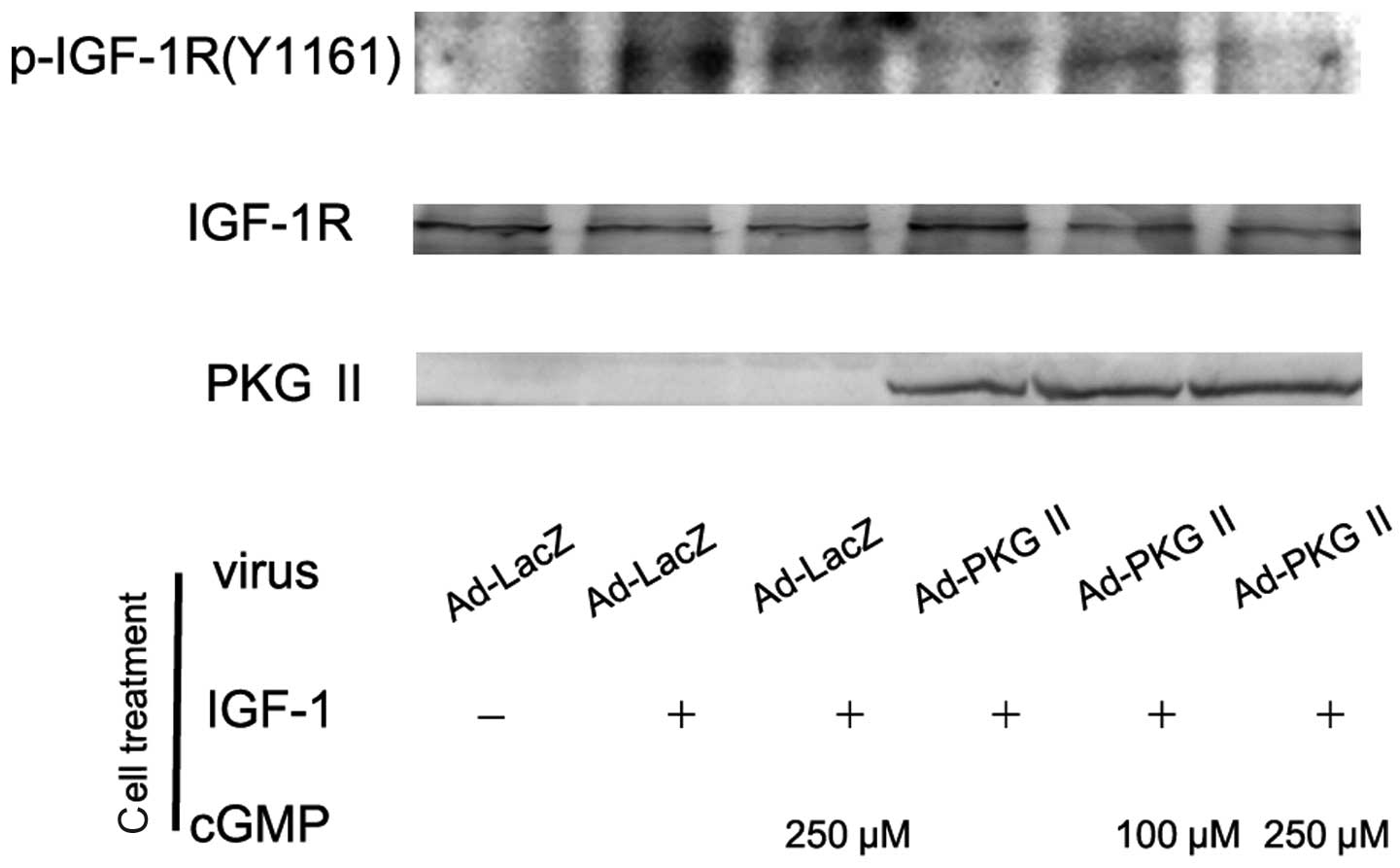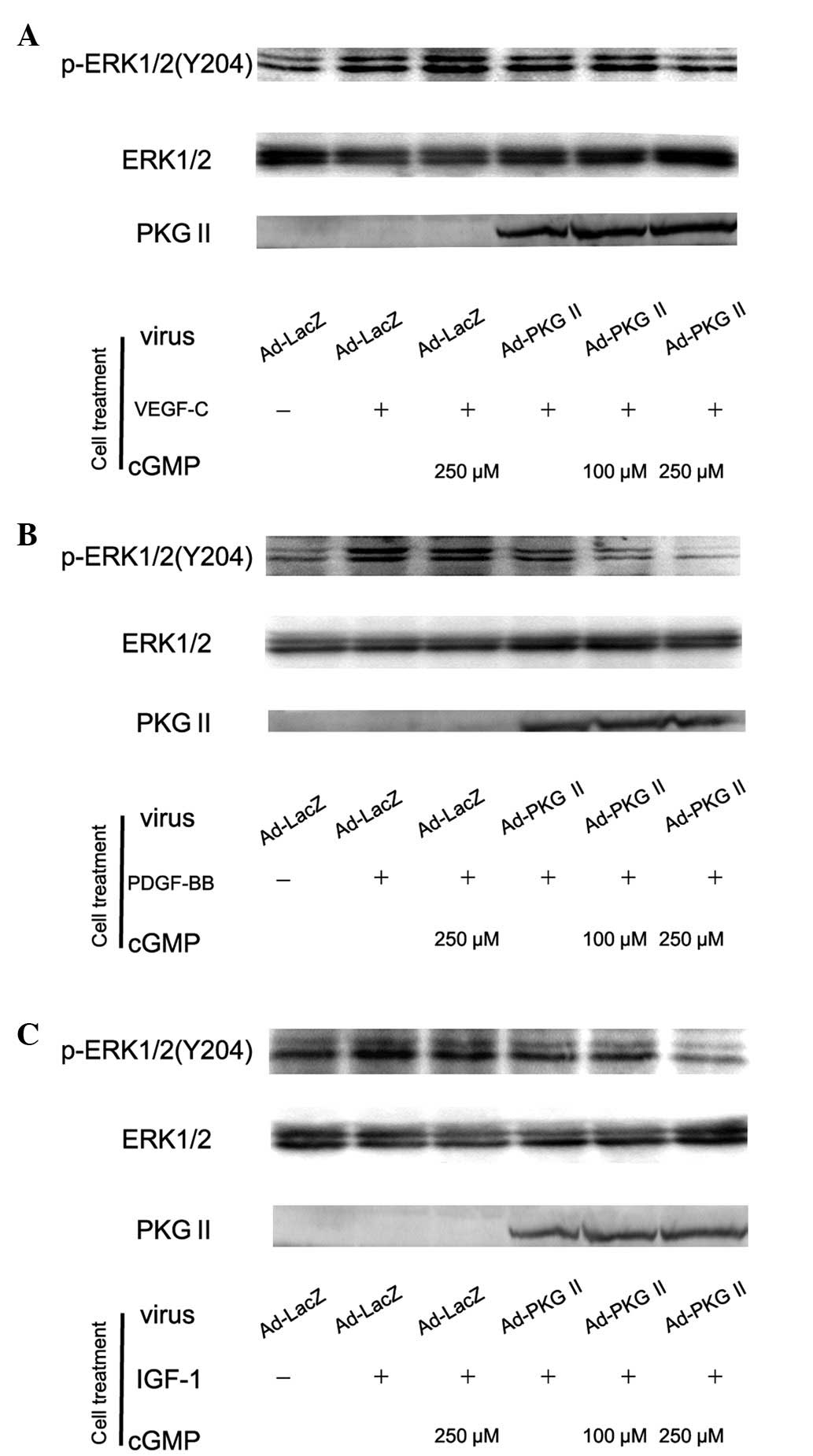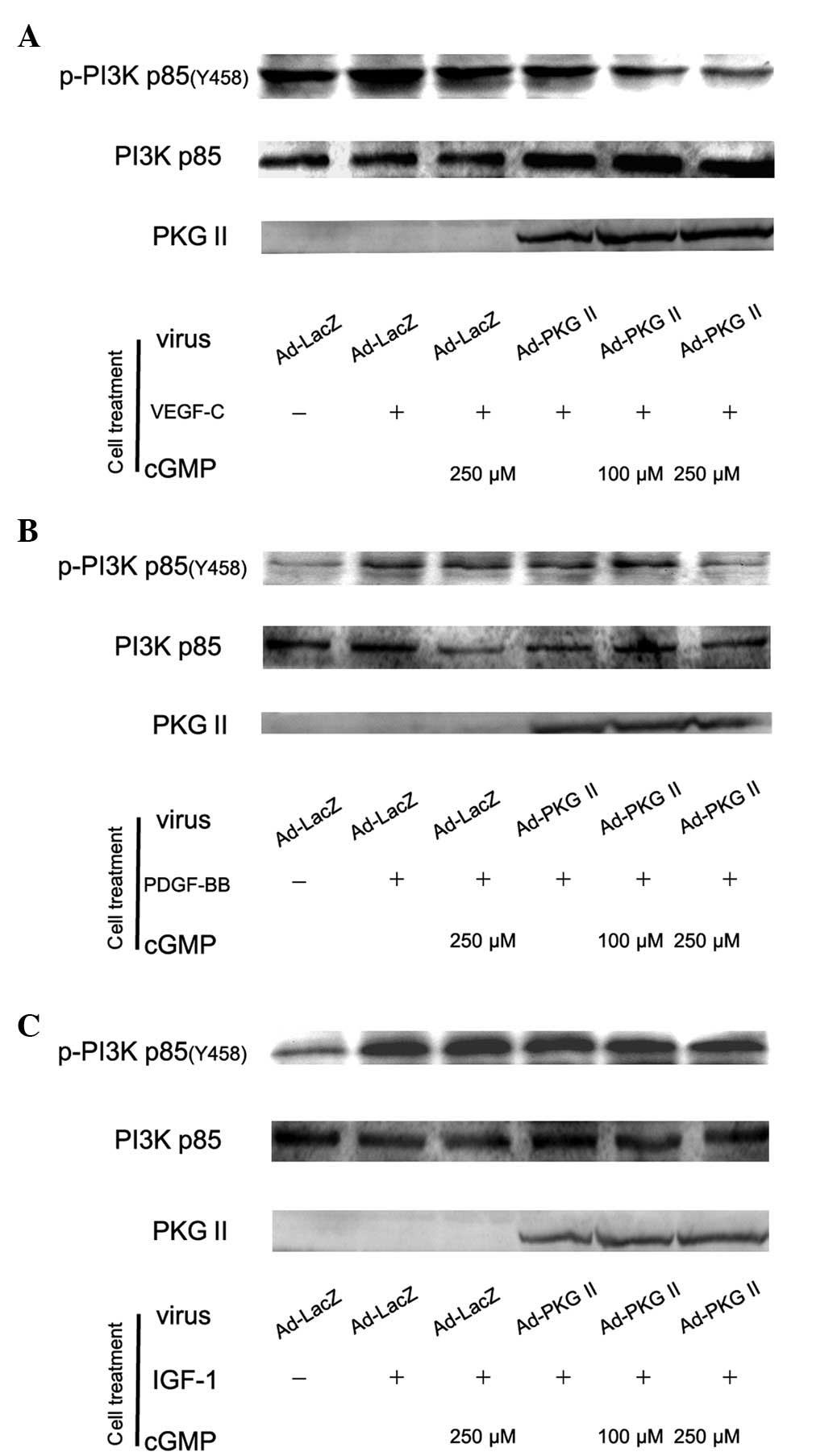|
1
|
Robinson DR, Wu YM and Lin SF: The protein
tyrosine kinase family of the human genome. Oncogene. 19:5548–5557.
2000. View Article : Google Scholar : PubMed/NCBI
|
|
2
|
Zwick E, Bange J and Ullrich A: Receptor
tyrosine kinase signalling as a target for cancer intervention
strategies. Endocr Relat Cancer. 8:161–173. 2001. View Article : Google Scholar : PubMed/NCBI
|
|
3
|
Lemmon MA and Schlessinger J: Cell
signaling by receptor-tyrosine kinases. Cell. 141:1117–1134. 2010.
View Article : Google Scholar : PubMed/NCBI
|
|
4
|
Choura M and Rebaï A: Receptor tyrosine
kinases: from biology to pathology. J Recept Signal Transduct Res.
31:387–394. 2011. View Article : Google Scholar : PubMed/NCBI
|
|
5
|
Zhang H, Berezov A, Wang Q, et al: ErbB
receptors: from oncogenes to targeted cancer therapies. J Clin
Invest. 117:2051–2058. 2007. View
Article : Google Scholar : PubMed/NCBI
|
|
6
|
Stuttfeld E and Ballmer-Hofer K: Structure
and function of VEGF receptors. IUBMB Life. 61:915–922. 2009.
View Article : Google Scholar
|
|
7
|
Holmes K, Roberts OL, Thomas AM and Cross
MJ: Vascular endothelial growth factor receptor-2: structure,
function, intra-cellular signalling and therapeutic inhibition.
Cell Signal. 19:2003–2012. 2007. View Article : Google Scholar
|
|
8
|
Suzuki S, Dobashi Y, Hatakeyama Y, et al:
Clinicopathological significance of platelet-derived growth factor
(PDGF)-B and vascular endothelial growth factor-A expression, PDGF
receptor-β phosphorylation, and microvessel density in gastric
cancer. BMC Cancer. 30:659–668. 2010.PubMed/NCBI
|
|
9
|
Hartog H, Wesseling J, Boezen HM and van
der Graaf WT: The insulin-like growth factor 1 receptor in cancer:
old focus, new future. Eur J Cancer. 43:1895–1904. 2007. View Article : Google Scholar : PubMed/NCBI
|
|
10
|
Ouban A, Muraca P, Yeatman T and Coppola
D: Expression and distribution of insulin-like growth factor-1
receptor in human carcinomas. Hum Pathol. 34:803–808. 2003.
View Article : Google Scholar : PubMed/NCBI
|
|
11
|
Cook AL and Haynes JM: Protein kinase G
II-mediated proliferative effects in human cultured prostatic
stromal cells. Cell Signal. 16:253–261. 2004. View Article : Google Scholar : PubMed/NCBI
|
|
12
|
Cook AL and Haynes JM: Phosphorylation of
the PKG substrate, vasodilator-stimulated phosphoprotein (VASP), in
human cultured prostatic stromal cells. Nitric Oxide. 16:10–17.
2007. View Article : Google Scholar : PubMed/NCBI
|
|
13
|
Chiche JD, Schlutsmeyer SM, Bloch DB, et
al: Adenovirus-mediated gene transfer of cGMP-dependent protein
kinase increases the sensitivity of cultured vascular smooth muscle
cells to the antiproliferative and pro-apoptotic effects of nitric
oxide/cGMP. J Biol Chem. 273:34263–34271. 1998. View Article : Google Scholar
|
|
14
|
Hood J and Granger HJ: Protein kinase G
mediates vascular endothelial growth factor-induced Raf-1
activation and proliferation in human endothelial cells. J Biol
Chem. 273:23504–23508. 1998. View Article : Google Scholar : PubMed/NCBI
|
|
15
|
Swartling FJ, Ferletta M, Kastemar M, et
al: Cyclic GMP-dependent protein kinase II inhibits cell
proliferation, Sox9 expression and Akt phosphorylation in human
glioma cell lines. Oncogene. 28:3121–3131. 2009. View Article : Google Scholar : PubMed/NCBI
|
|
16
|
Wang R, Kwon IK, Thangaraju M, et al: Type
2 cGMP-dependent protein kinase regulates proliferation and
differentiation in the colonic mucosa. Am J Physiol Gastrointest
Liver Physiol. 303:G209–G219. 2012. View Article : Google Scholar : PubMed/NCBI
|
|
17
|
Yang SQ, Chen YC, Wang Y, et al:
Expression of cGMP dependent protein kinase II in cancer cell lines
was obviously decreased. J Jiangsu Univ (Medicine edition). 18:1–5.
2008.
|
|
18
|
Chen YC, Ren F, Sang JR, et al: Type II
cGMP-dependent protein kinase inhibits proliferation of the gastric
cancer cell line BGC-823. Mol Med Rep. 3:361–366. 2010.PubMed/NCBI
|
|
19
|
Wu Y, Chen Y, Qu R, et al: Type II
cGMP-dependent protein kinase inhibits EGF-triggered signal
transduction of the MAPK/ERK-mediated pathway in gastric cancer
cells. Oncol Rep. 27:553–558. 2010.PubMed/NCBI
|
|
20
|
Lan T, Chen Y, Sang J, et al: Type II
cGMP-dependent protein kinase inhibits EGF-induced MAPK/JNK signal
transduction in breast cancer cells. Oncol Rep. 27:2039–2044.
2012.PubMed/NCBI
|
|
21
|
Fournier NM, Lee B, Banasr M, et al:
Vascular endothelial growth factor regulates adult hippocampal cell
proliferation through MEK/ERK- and PI3K/Akt-dependent signaling.
Neuropharmacology. 63:642–652. 2012. View Article : Google Scholar : PubMed/NCBI
|
|
22
|
Pratsinis H and Kletsas D: PDGF, bFGF and
IGF-I stimulate the proliferation of intervertebral disc cells in
vitro via the activation of the ERK and Akt signaling pathways. Eur
Spine J. 16:1858–1866. 2007. View Article : Google Scholar : PubMed/NCBI
|
|
23
|
Quatrale AE, Porcelli L, Silvestris N, et
al: EGFR tyrosine kinases inhibitors in cancer treatment: in vitro
and in vivo evidence. Front Biosci. 16:1962–1972. 2011. View Article : Google Scholar : PubMed/NCBI
|
|
24
|
Normanno N, Bianco C, De Luca A, et al:
Target-based agents against ErbB receptors and their ligands: a
novel approach to cancer treatment. Endocr Relat Cancer. 10:1–21.
2003. View Article : Google Scholar : PubMed/NCBI
|
|
25
|
Oda K, Matsuoka Y, Funahashi A and Kitano
H: A comprehensive pathway map of epidermal growth factor receptor
signaling. Mol Syst Biol. 1:2005.00102005.PubMed/NCBI
|
|
26
|
Hicklin DJ and Ellis LM: Role of the
vascular endothelial growth factor pathway in tumor growth and
angiogenesis. J Clin Oncol. 23:1011–1127. 2005. View Article : Google Scholar : PubMed/NCBI
|
|
27
|
Gretschel S, Astrosini C, Vieth M, et al:
Markers of tumor angiogenesis and tumor cells in bone marrow in
gastric cancer patients. Eur J Surg Oncol. 34:642–647. 2008.
View Article : Google Scholar : PubMed/NCBI
|
|
28
|
Koch S and Claesson-Welsh L: Signal
transduction by vascular endothelial growth factor receptors. Cold
Spring Harb Perspect Med. 2:a0065022012. View Article : Google Scholar : PubMed/NCBI
|
|
29
|
Heldin CH: Structural and functional
studies on platelet-derived growth factor. EMBO J. 11:4251–4259.
1992.PubMed/NCBI
|
|
30
|
Li ZF, Su YF and Chen XP: Expression of
platelet-derived growth factor receptor in hepatocellular carcinoma
and portal vein tumor thrombus. Acta Academiae Medicinae Qingdao
Universitatis. 44:307–311. 2008.(In Chinese).
|
|
31
|
Luo HG, Ding YW, Ma TX, et al: Study on
the correlation between flt-1, bFGFR, PDGFR and tumor biology in
pancreatic carcinoma. Zhonghua Xiao Hua Wai Ke Za Zhi. 1:253–255.
2002.(In Chinese).
|
|
32
|
Zhu HT, Han J and Ma L: Expression and
clinical significance of PDGFRalpha and PDGFRbeta in colorectal
cancer. Ai Zheng. 27:654–660. 2008.(In Chinese).
|
|
33
|
Liu DC, Li RG, Zhou JP, et al:
Relationship between the expression of PDGF and PDGFR and MVC in
the gastric carcinoma. Zhongguo Lin Chuang Yi Sheng. 5:1061–1062.
2003.(In Chinese).
|
|
34
|
Board R and Jayson GC: Platelet-derived
growth factor receptor (PDGFR): a target for anticancer
therapeutics. Drug Resist Updat. 8:75–83. 2005. View Article : Google Scholar : PubMed/NCBI
|
|
35
|
Jones JI and Clemmons DR: Insulin-like
growth factors and their binding proteins: biological actions.
Endocr Rev. 16:3–34. 1995.PubMed/NCBI
|
|
36
|
Neid M, Datta K, Stephan S, et al: Role of
insulin receptor substrates and protein kinase C-zeta in vascular
permeability factor/vascular endothelial growth factor expression
in pancreatic cancer cells. J Biol Chem. 279:3941–3948. 2004.
View Article : Google Scholar
|



















